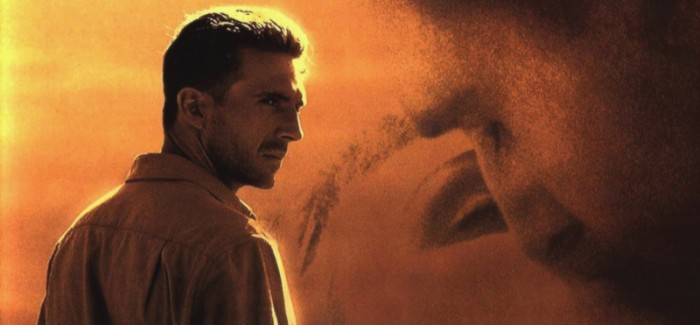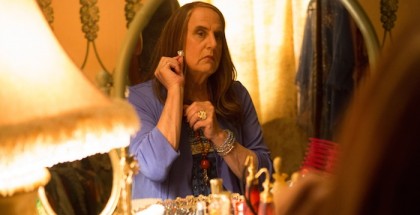VOD film review: The English Patient
Review Overview
Direction
9Passion
9Performances
9Simon Kinnear | On 12, Jan 2014
Director: Anthony Minghella
Cast: Ralph Fiennes, Kristin Scott Thomas
Certificate: 15
Watch The English Patient online: TalkTalk TV / Apple TV (iTunes) / Prime Video (Buy/Rent) / Rakuten TV / Google Play
Every weekend during the 2014 awards season, we look back at past award winners and where you can watch them online. Today, it’s 1997 Best Picture The English Patient.
Many Best Picture Oscar winners suffer the indignity of a backlash once the hype has died down, but not every one gets an episode of a sitcom devoted to taking the piss out of it. Yet that’s exactly what happened to The English Patient, whose name doubles as the title to an episode of Seinfeld in which Elaine is ostracised for declaring her hatred of the movie.
It’s easy to see where Elaine is coming from, as the unabashed, swooning romanticism of Anthony Minghella’s film is very mockable – but there’s also something satisfying about a British director confident enough to be that emotional, and accomplished enough to have the filmmaking tools to make a film as visually and tonally lyrical as this one. On paper, it’s yer typical Brit-lit adaptation, custom-made for middlebrow audiences who only visit the cinema for the prestige pics, but there’s a difference from, say, Minghella’s later Cold Mountain, in that it’s not quite such a blatant Oscar-botherer.
That’s because it’s an indie – or, at least, Indiewood – production, made by Miramax (in the days before it effectively became a studio in its own right) when bigger fish bailed out. And here’s a film that benefits from being made in a relatively small pond. In scope, it’s grand enough, moving from the deserts of North Africa to the grassy hills of Italy, with sandstorms, war and two plane crashes along the way. But Minghella makes this a surprisingly small-scale, intimate film. Half of it takes place in a bedroom, usually with just two characters conversing, and even the flashbacks stop short of being expansive, Minghella getting in close to concentrate on the actors rather than the backdrops. Revealingly, here’s an epic that isn’t shot in ‘Scope ratio, which is handy if you’re watching it on an iPad.
Instead, the sweep of the film comes from Walter Murch’s extraordinary editing; in its luxurious dissolves and effortless undulations between past and present, this is one of the most beautifully hypnotic of recent attempts at a period film, finding meaning and resonance through gentle strokes rather than the fidgety cutting that prevails today. If that makes it sound old-fashioned, that’s because it is – Minghella, Murch and cinematographer John Seale are dedicated to preserving a certain old-school grace and panache.
As such, it’s an intensely cinematic experience, surprisingly so considering it’s based on a Booker-prize winning novel and whose ideas are shamelessly rooted in literary tradition. It’s a study of ‘ownership’, particularly as it relates to national identity but using various metaphors and paradigms – maps, romance – to show how life is a clash of individualities, each determined to stamp their authority on other things and people. Memory is the only refuge, so best keep it hidden – but beware that other people’s memories may intrude even in that place.
Somehow, though, Minghella stops this being dry by foregrounding that aching sense of romance and soul that annoyed Elaine Benes so much. Ralph Fiennes is a revelation as Count Almasy, allowing his buttoned-up solitude to be undone by live wire Kristin Scott Thomas (never better as the temptress who dares starchy Fiennes to cross the border, so to speak). Their affair has palpable heat, their parting offers unfakeable tragedy.
But even better is the present-day subplot, as Almasy belatedly gets his wish – a world of freedom, without borders – in Juliette Binoche’s effervescent nurse. Hana’s laissez-faire humanism, captured in Binoche’s extraordinary smile, defines the film, while the loose, undemanding love affair between her French Canadian and Naveem Andrew’s Indian Gurkha has just the lightness of touch needed to contrast with the heaviness of Fiennes’ and Scott Thomas’ doomed affair.
Ignore Seinfeld. Minghella’s sumptuous-but-subtle ‘indie epic’ mixes literate intelligent and cinematic passion to defy its middlebrow reputation.






















